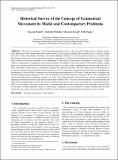Historical survey of the concept of ecumenical movement its model and contemporary problems
Publication Date
2012Author
Kasomo Daniel Ombachi, Nicholas Musyoka, Joseph Naila Napoo
Metadata
Show full item recordAbstract/
The term “ecumenical” in theology today generally refers to the movement which seeks to achieve external
unity among the world’s denominationally divined churches.The original meaning of the word (from oikeo:to dwell, inhabit;
and oikos: house, household; oikoumene: the whole inhabited earth[Lk. 4: 5]) has lapsed into disuse, as did the later
development of the sense of a common basic attitude or into disuse, as did the later development of the sense of a common
basic attitude or doctrinal consensus by the “inhabitants” of the surface of the earth or the members of the church. A more
modern, comprehensive meaning has since been developed: “ecumenical” means the entirety of the church, which, looking
back to its common original traditional and looking forward to its hope, seeks a commonality in doctrine and in the life of
faith. Movement toward unity or cooperation among the Christian churches. The first major step in the direction of
ecumenis m was the International Missionary Conference of 1910, a gathering of protestant. Several Protestant denominations
inaugurated a Life and Work Conference (on social and practical problems) in 1925 and a Faith and Order Conference (on
church doctrine and governance) in 1927. After World War II the World Council of Churches (WCC) was established; the
International Missionary Conference joined it in 1961. The Roman Catholic church also has shown strong interest in
improving interchurch relations since the Second Vatican Council (1962 – 65) and, with the patriarch of Constantinople, has
lifted the excommunication of 1054. The Eastern Orthodox church was active in the movement since 1920 and joined the
WCC at its inception. The more conservative or fundamentalist Protestant denominations have generally refrained from
involvement. Another important factor in 20th-century ecumenism was the creation of united churches that reconcile
splintered sects, such as the United Church of Christ (1957) and the Evangelical Lutheran Church in America (1988).

